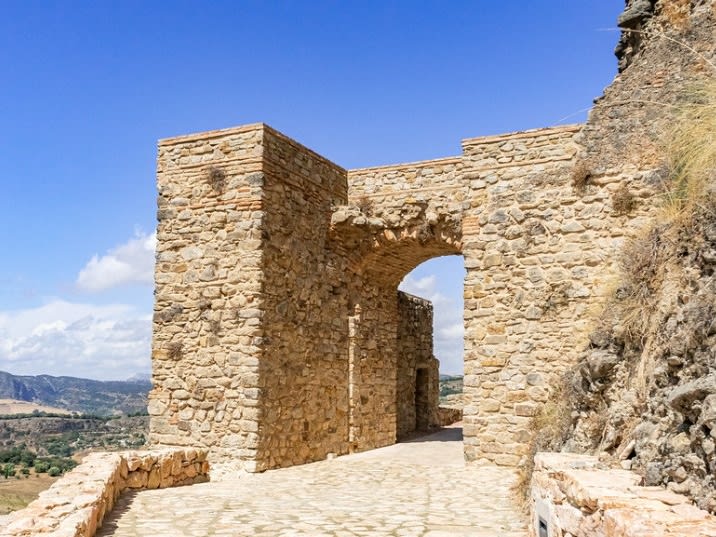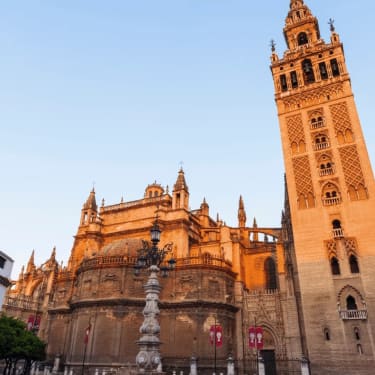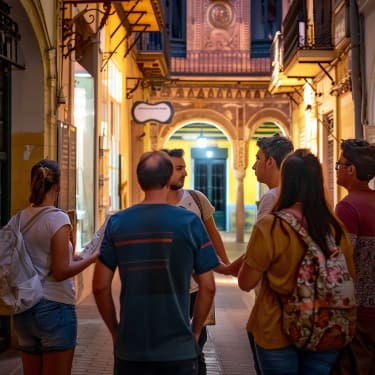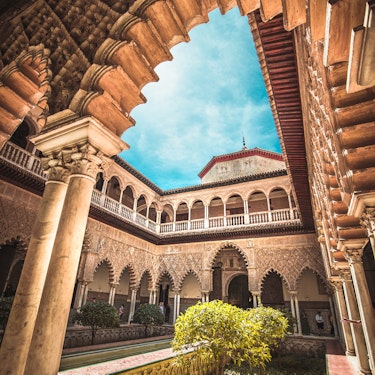More about: 4 Best Day Trips to White Villages from Seville
In the center of Seville there are monuments, bars, monasteries, tablaos, good food and crowds everywhere, but if you want to enjoy 10 viewpoints in the middle of a protected nature reserve, one of the things to see and do in Seville is to take an excursionto the Pueblos Blancos.
In this post you will discover the best excursions with private route or guided tours, and prices. In short, everything you need to know to organize your trip you will find below.
1. Excursion route to the White Villages: Ronda

This is the most popular plan among the Pueblos Blancos that you can see in Seville. The trip includes a guided visit to the highlights of Ronda as they are:
- Puerta Del Viento.
- Puerta de los Molinos.
- The House of the Moorish King.
- The Plaza de Toros de la Real Maestranza de la Caballería de Ronda.
- The viewpoint of the romantic travelers.
- The Walls of Ronda.
- The Tajo and much more.
As you stroll through the historic center of the city, your expert guide will explain the historical events, main monuments and curiosities of the city. You will also have time to explore independently, with some recommendations to help you get the most out of your visit.
- Duration: Between 8 and 10 hours, depending on the tour you choose.
- Price: From 71 €.
- What it may include: Pick up at the meeting point, guided tour in Spanish to the Aguzaderas Castle: and to the Oil Mill of Zahara de la Sierra, the passage through the forests of Pinsapos until heading to the mythical city of Ronda. At each stop we visit the emblematic monuments and viewpoints of the city.
2. Excursion to El Coronil, Zahara de la Sierra, Grazalema and Ronda

Once you start your tour to the Pueblos Blancos you won't want to leave. Its contrasts between mountains, forest and mountains provide a warm welcome, so if you are looking for a complete and cheap excursion to the White Villages of Seville, this is the alternative you were looking for. Write it down as one of the 10 things to do in Seville in spring.
First section: El Coronil Here the guide will take you to visit the Aguzaderas Castle. During the walk through this six-towered fortress, the expert will share the importance of the unconventional location, the history of power and the use of water for more than five centuries in this area.
Second leg: Zahara de la SierraThe tour will continue through the Sierra de Cádiz until you reach Zahara de la Sierra. The guide will take you to the Iglesia Mayor, a must-see of this white village. Its transformation from mosque to church and the devotion to the Blessed Sacrament are cornerstones of the regional history. Finally, the group will visit the Molino El Vínculo mill, the only old mill that still produces olive oil in the region.
Third section: Sierra de GrazalemaThe penultimate stop is one of the biospheres protected by UNESCO, the Sierra de Grazalema. The whole area is a visual delight for nature lovers. The picturesque streets, La Manga de Villaluenga, the Salto del Cabrero and El Saltadero, will not go unnoticed. Then the group will move to the final stretch in the Necropolis of the Giants.
Fourth stretch: RondaTo close with a flourish, the coveted Ronda. You will be amazed, there you will find:
- The Interpretation Center of the New Bridge.
- The Church of Santa María La Mayor.
- The Museum of the Bandolero.
- Viewpoints like the one of the wind and Hoya del Tajo.
- The Arab baths.
- The Palace of Mondragon.
- The bullring of the Real Maestranza de la Caballería de Ronda.
- The sculptures of Ernest Hemingway and Orson Welles.
- Duration: 1 day, depending on the tour operator.
- Prices: From 79 €.
- What can be included: private transportation round trip, travel insurance and specialized guide.
3. Excursion to Zahara de la Sierra, Grazalema and Ronda

If you are thinking what to see and do in Seville in 2 days this could be the ideal plan for you. The Zahara de la Sierra, Grazalema and Ronda extends between the sierra its forests full of cork oaks, plateaus and oaks.
This tour allows you to take the time to explore spectacular cliffs, enjoy the surroundings of the Guadalevín river, traditions and Andalusian cuisine in the three villages along the route. For its complete route, comfort and included accommodation this is the executive option among the excursions to the White Villages of Seville.
When you arrive in Ronda, your guide will take you to tour a real oil mill, walk through El bodegón, the previous full-day spots such as the Maestranza de la Caballería de Ronda and many other surprises for you to know in detail the reasons that provide the mystical and romantic accent of the second most populated city in the province.
- Duration: Between 36 and 38 hours, depending on the tour you choose.
- Prices: From 179 €.
- What it may include: Expert guided tour in Spanish, private transportation to and from Seville, access to a traditional oil mill, the Aguzaderas Castle, walk through the white villages of Zahara de la Sierra, Grazalema and Ronda, one night's accommodation in a 3 or 4 star hotel.
4. Excursion to Zahara de la Sierra, Setenil de las Bodegas and Ronda

This three-leg tour offers the advantage of visiting the peculiar village of Setenil de las Bodegas, the only one among the White Villages of Andalusia with houses in caves. In addition, the tour is guided by a historian and expert guide. The tour route passes through:
First section: Zahara de la Sierra A walk of about 2 hours through the picturesque streets of the town will take you to the famous Molino El Vinculo while the mountainous landscape is drawn in the background.
Second section: Setenil de las BodegasThe small group will witness the traces that the Celts, Moors and Christians shaped between castles, caves, churches, caves and towers. The landscape drawn by the plateaus and romantic corners is charming. You can add this destination as one of the things to do in Seville in winter, when Valentine's Day arrives. Take your picture under the sign "Kiss me in this corner" for the memory.
Through the Calle del Sol you will reach the Castle of Setenil de las Bodegas where the Tower, the Tower and the Aljibe summarize the history of the village inside. The guide will take you to visit the Aljibe where the Damita de Setenil, a female Chalcolithic symbol of the town that was built 3,000 years ago B.C., will welcome you.
Third section: Setenil de las BodegasThe penultimate stop is one of the biospheres protected by UNESCO, the Sierra de Grazalema. The whole area is a visual delight for nature lovers. The picturesque streets, La Manga de Villaluenga, the Salto del Cabrero and El Saltadero, will not go unnoticed. Then the group will move on to the final stretch at the Necropolis of the Giants.
- Duration: 1 day, depending on the tour operator.
- Prices: From 300 €.
- What can be included: private transportation to and from the hotel, travel insurance and a historian as a specialized guide.
Why is it advisable to take a guided excursion to the White Villages of Seville?

- The guides are experts in the area and know the main attractions of the city. When the sites of interest are numerous these specialists offer different packages and routes adjusted to your plans.
- Unlike other cities in Europe, the tour guides in Pueblos Blancos have the best rates in the market. For less than 80 € your services will be covered, not bad right?
- The sites of interest show a summary of the history of each monument but only a guide can put that information together and tell the story of a village. The stories, curiosities, anecdotes and urban legends are only shared by an expert guide.
- They provide attention in different languages such as English, Italian and French. For multicultural groups this is valuable. Consult with your operator and get a guide in your language.
- In the Pueblos Blancos changes in agenda are the order of the day. Your tour guide designs the plan without haste or stress. You can consult Hellotickets with any of our operators to design your itinerary.
How to get to the Pueblos Blancos from Seville: Means of Transportation

By trainThe best way to get to Cadiz is by train. The railway company operates two trains that make the journey to Cadiz every day, both trains are classified as "Media Distancia".
In its first option the journey time between Santa Justa in Seville and Cadiz is 1:28 minutes.
The second alternative for the same 102 km journey by train is 1:42 minutes.
Tickets can be purchased from 7.55 €.
By planeTo the airport of Jerez de la Frontera in Cadiz you can connect with national and international flights. From Seville there are direct flights and from there you can connect to the Pueblos Blancos from 130 €.
By busTour the Pueblos Blancos by bus! This is a great opportunity to leave the coast and travel through green landscapes ending in the picturesque white houses.
The Service of the Junta de Andalucía is formed by the websites of the Metropolitan Transport Consortium of Cadiz-Huelva-Cadiz and the Andalusian Transport Consortium of Seville-Malaga. Through its maps, it will provide you with all the information you need about transport routes, timetables, stations and contact details, for less than 20 €. You will have reached the Pueblos Blancos from Seville.
By private carCadiz is easily reached by car. From the center it is possible to take the A4 freeway, which connects the south of the peninsula. You also have the southern highway AP-4, now toll-free along its entire route.
Which towns should I visit on a route through the Pueblos Blancos?

The truth is that with time and budget to make the complete route of the White Villages would be ideal, however, a group stands out for its history, mills, natural parks, castles and styles, they are:
-
El Coronil. It is a kind of gateway to the Pueblos Blancos. In this town you will find the famous Castillo de las Aguzaderas, where these fortresses were strategically located to protect the water spring of the local fountain. The construction is impressive and its history combines the traces of the Arabs with the Christian vision of the Middle Ages.
-
Cádiz. In this town you will find the villages of Zahara de la Sierra, Olvera and Setenil de las Bodegas as part of the Sierra de Grazalema. Its most characteristic natural environment are the caves and grottoes formed by the erosion of the plateaus.
In these villages you can walk through its medieval villages where its Clock Tower, Setenil Castle, the Moorish Castle, the Chapel of San Juan de Dios Letran, the Church of Our Lady of the Incarnation and its small artificial beach in Arroyomolinos make up its main attractions.
-
Grazalema. At an altitude of 800 m, Grazalema has been home to several civilizations. At the foot of the Veleta Peak it exhibits an important environmental wealth. Grazalema has the highest rainfall in Spain (1,200 mm per year). In this town the mountains and valleys contrast. It is home to numerous pine forests, such as the famous Pinsapos, as well as oaks, holm oaks or junipers in contrast to its arid or lime-rich environments.
-
Ronda. The tour of the White Villages would be incomplete without the most popular of all: the village of Ronda. In the heart of this mountain range you will witness impressive monuments such as: the Paseo de Los Toreros, the Casa del Rey Moro, La Alameda, El Tajo, the Puerta del Viento, its famous Arab baths from medieval times and the Puente Nuevo. Ronda is known to be a romantic getaway par excellence in Spain.
Why are they called Pueblos Blancos?

The zigzagging roads in southern Andalusia are hot lands and rainfall is rare. In summer the temperature reaches 40° so the residents of these picturesque villages found a cheap, efficient and quick way to minimize the effects of the sun by covering their facades in white.
As a curiosity it is not merely painting but whitewashing or stuccoing.
- Whitewashing. It is a combination of water, sand or plaster and lime that takes the color of the latter component.
- Stucco. Used by the more affluent neighbors. To the whitewash mortar they added (or add) marble powder, thus refining the final finish.
Benefits?
- The white color reflects the sun's rays, reducing the temperature of the house and of the town itself. Lime has bactericidal, fungicidal and antiseptic properties.
- It is breathable. Considering that adobe, masonry and stone are the materials used in these houses, it is useful to adapt the breathability of the structure.
- Finally, these materials are available in every corner of the peninsula and their price is affordable.
Map of the White Villages of Andalusia
The tour of the White Villages of Andalusia includes more than 20 municipalities from Arcos de la Frontera through Zahara de la Sierra and Ronda to Castellar de la Frontera.
An expert knows the towns, however, in case you decide to plan a self-guided visit, you can be guided by the route demarcated in GoogleMaps, this way you will know how to move around the Pueblos Blancos de Sevilla without missing any of these charming towns.














